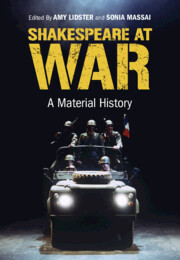Book contents
- Shakespeare at War
- Shakespeare at War
- Copyright page
- Contents
- Figures
- Notes on Contributors
- Acknowledgements
- Note on the Text
- Introduction
- Chapter 1 ‘The Truth for Which We Are Fighting’
- Chapter 2 The Seven Years’ War (1756–1763) and Garrick’s Shakespearean Nationalism
- Chapter 3 Revolutionary Shakespeare
- Chapter 4 Hamlet Mobilized
- Chapter 5 Shakespeare, the North-West Passage, and the Russian War
- Chapter 6 ‘Now for Our Irish Wars’
- Chapter 7 Shakespeare and the Survival of Middle England
- Chapter 8 Ellen Terry Stars at the Shakespeare Hut
- Chapter 9 The 1916 Shakespeare Tercentenary at № 1 Camp in Calais
- Chapter 10 Shakespeare Does His Bit for the War Effort
- Chapter 11 Germanizing Shakespeare during the First World War
- Chapter 12 Readers and Rebels
- Chapter 13 Forgotten Histories
- Chapter 14 ‘Now Good or Bad, ’tis but the Chance of War’
- Chapter 15 ‘Precurse of Feared Events’
- Chapter 16 But What Are We Fighting For?
- Chapter 17 Henry V and the Battle of Powerscourt
- Chapter 18 Unser Shakespeare in Nazi Germany
- Chapter 19 Framing the Jew
- Chapter 20 G. Wilson Knight’s ‘Royal Propaganda’ in ‘This Sceptred Isle’ (1941)
- Chapter 21 Shakespeare’s Desert Camouflage
- Chapter 22 ‘May I with Right and Conscience Make This Claim?’
- Chapter 23 Henry V and the Invasion of Iraq
- Chapter 24 Who Pays the Price?
- Chapter 25 ‘Mere Prattle, without Practice, Is All His Soldiership’
- Chapter 26 ‘Thou Hast Set Me on the Rack’
- Afterword
- Notes
- Index
Chapter 11 - Germanizing Shakespeare during the First World War
Published online by Cambridge University Press: 17 August 2023
- Shakespeare at War
- Shakespeare at War
- Copyright page
- Contents
- Figures
- Notes on Contributors
- Acknowledgements
- Note on the Text
- Introduction
- Chapter 1 ‘The Truth for Which We Are Fighting’
- Chapter 2 The Seven Years’ War (1756–1763) and Garrick’s Shakespearean Nationalism
- Chapter 3 Revolutionary Shakespeare
- Chapter 4 Hamlet Mobilized
- Chapter 5 Shakespeare, the North-West Passage, and the Russian War
- Chapter 6 ‘Now for Our Irish Wars’
- Chapter 7 Shakespeare and the Survival of Middle England
- Chapter 8 Ellen Terry Stars at the Shakespeare Hut
- Chapter 9 The 1916 Shakespeare Tercentenary at № 1 Camp in Calais
- Chapter 10 Shakespeare Does His Bit for the War Effort
- Chapter 11 Germanizing Shakespeare during the First World War
- Chapter 12 Readers and Rebels
- Chapter 13 Forgotten Histories
- Chapter 14 ‘Now Good or Bad, ’tis but the Chance of War’
- Chapter 15 ‘Precurse of Feared Events’
- Chapter 16 But What Are We Fighting For?
- Chapter 17 Henry V and the Battle of Powerscourt
- Chapter 18 Unser Shakespeare in Nazi Germany
- Chapter 19 Framing the Jew
- Chapter 20 G. Wilson Knight’s ‘Royal Propaganda’ in ‘This Sceptred Isle’ (1941)
- Chapter 21 Shakespeare’s Desert Camouflage
- Chapter 22 ‘May I with Right and Conscience Make This Claim?’
- Chapter 23 Henry V and the Invasion of Iraq
- Chapter 24 Who Pays the Price?
- Chapter 25 ‘Mere Prattle, without Practice, Is All His Soldiership’
- Chapter 26 ‘Thou Hast Set Me on the Rack’
- Afterword
- Notes
- Index
Summary
The outbreak of the First World War presented the German Kaiserreich’s cultural elite with a major dilemma. Should they jettison the output of poets and playwrights, artists and musicians from the newly hostile Entente countries from programmes for public consumption? Or should they claim them as part of the common cultural stock of humanity, and continue to enjoy them as before? These debates rose to an especially acute pitch over the works of Shakespeare, which by 1914 had become a much-loved staple of the Wilhelmine dramatic canon. Rather than abandoning Shakespeare, German elites began an intensive campaign to reframe Germany as his ‘true’ home, rooted in his apparent closeness to the essence of the ‘German spirit’ – with correlative contempt for his supposedly inadequate reception in the Anglosphere. Shakespearean texts and cultural institutions were also co-opted systematically into the Kaiserreich’s war effort: to boost the morale and lionize the calibre of the German soldiery, to mark milestone events in the war’s trajectory, and as part of German diplomatic offensives abroad, especially in neutral countries. Overall, this essay casts wartime Shakespeare in a new and unusual light, illustrating the potential for state military propaganda to engage in projects of cultural reclamation.
Keywords
- Type
- Chapter
- Information
- Shakespeare at WarA Material History, pp. 111 - 120Publisher: Cambridge University PressPrint publication year: 2023

